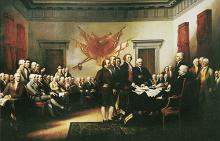
But the document that declared independence for the 13 American colonies from the tyranny of England’s King George III, signed by 56 men, was considered an act a treason by the crown and punishable by hanging. And the price for securing freedom for the newly minted republic required personal and financial sacrifice.
“For their dedication to the cause of independence, the signers risked loss of fortune, imprisonment, and death for treason,” states the biographies of the signers posted on the National Park Service website.
“Although none died directly at the hands of the British, the wife of one, Mrs. Francis Lewis, succumbed as a result of harsh prison treatment,” the websites says. “About one-third of the group served as militia officers, most seeing wartime action. Four of these men (Thomas Heyward, Jr. (South Carolina), Arthur Middleton (South Carolina), Edward Rutledge (South Carolina), and George Walton (Georgia), as well as Richard Stockton, were taken captive.”
“The homes of nearly one-third of the signers were destroyed or damaged, and the families of a few were scattered when the British pillaged or confiscated their estates,” the National Park Service site states.
The men – chosen to represent their states at the Continental Congress because of their achievements and positions – were lawyers, doctors, merchants, farmers and politicians. They ranged in education from being graduates of Harvard and Princeton to self-taught and one – George Taylor of Pennsylvania – arrived in this country as an indentured servant, according to the Park Service.
The signers ranged in age from 26 (Edward Rutledge of South Carolina) to 70 (Benjamin Franklin), but the bulk were in their 30s or 40s, the Park Service biographies state.
“Except for Charles Carroll (Maryland), a Roman Catholic, and a few Deists, every one subscribed to Protestantism,” the website says.
Two of the signers went on to be president of the United States — Thomas Jefferson and John Adams — and two others, Samuel Chase and James Wilson, served on the Supreme Court. Others served in Congress, as governors and diplomats.
Perhaps the final words on the Declaration itself provide the most succinct description of the courageous men who gave much more than a signature to secure the future of the country:
“And for the support of this Declaration with a firm reliance on the protection of divine providence, we mutually pledge to each other our lives, our fortunes, and our sacred honor.”
Source material can be found at this site.









